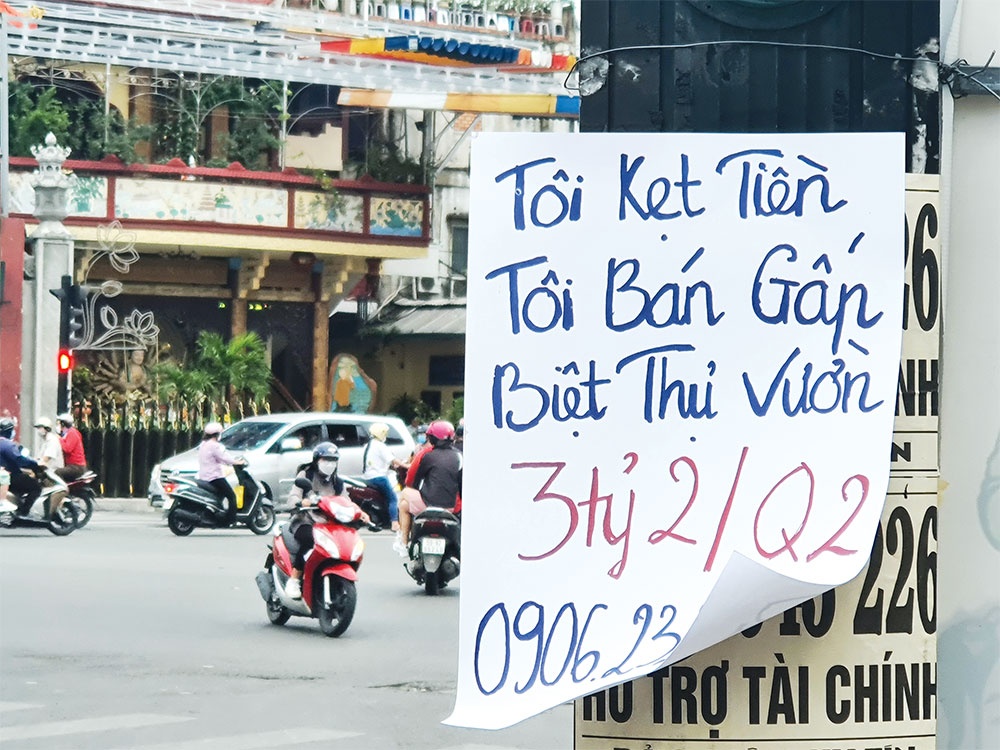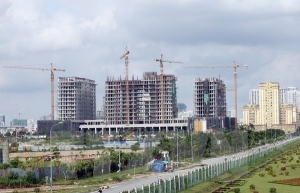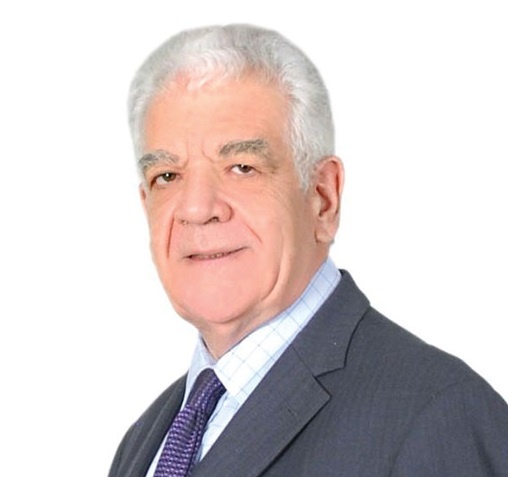Land assets failing to shift despite cuts
Banks have been increasing their asset quality by provisioning and speeding up the handling of collateral to recover debts. Along with this, a series of houses, apartments, and other projects have been put up for sale.
 |
| Some individuals in Vietnam are trying to sell their villas as collateral for bank loans |
In Thu Duc city, Agribank is selling four properties with a total area of nearly 1,800 square metres in Phu Huu ward, starting from $3 million. These are also villas owned by an individual but used as collateral for loans arising at Agribank Saigon Branch.
Sacombank is liquidating a series of real estate projects in districts 5, 10, 11, and 12, as well as in Binh Thanh district and Nha Be district of Ho Chi Minh City.
The most valuable asset among these is a land lot of 1,774sq.m in District 5, owned by an individual and used as collateral for a loan at the bank. However, due to the land buyer’s inability to pay the debt, Sacombank sold this debt to Vietnam Asset Management Company. Sacombank offers a starting price for this land lot of up to $23 million.
In Nha Be district, Sacombank is also selling a land plot and an attached factory with an area of nearly 60ha at Hiep Phuoc Industrial Zone (IZ). The land, for developing an IZ, has a starting price offered by Sacombank of $21.7 million.
And in June, Agribank offered six properties for sale in Da Kao ward in Ho Chi Minh City’s District 1 with a total area of nearly 2,000sq.m, starting at $12.2 million. These are all old villas with an area ranging from 290 to 360sq.m located on Tran Cao Van street.
Despite remarkably lowering the offered price many times during the past three years, two asset packages of Thuan Thao JSC in Tuy Hoa of the central province of Phu Yen remain unsold.
The first package includes the 5-star CenDeluxe Hotel, Thuan Thao Exhibition and Convention Centre with a total value of more than $21 million, and a Thuan Thao land plot worth $2.7 million. The second package is Thuan Thao Entertainment and Ecological Centre with a value of more than $5.1 million. The packages have been put up for auction 15 and 17 times respectively, but both remain unsold.
Explaining the reason why many projects could not be sold, Nguyen Van Dinh, vice president of the Vietnam Association for Realtors, said that liquidating assets is mostly not attractive for individual buyers. They meanwhile must think twice about the legal factors of such assets to avoid problems that may arise after the purchase. “In addition, many collateral assets were valued at higher prices than their actual value; therefore, when liquidating, banks often tend to set a price according to the value of the debt but not the market price,” Dinh said.
The demand for liquidated real estate is high, even for large-scale real estate projects, but in order to match the supply and demand, the property for sale needs to be ensured legally and conveniently in the transfer process. The most important factor is to evaluate the asset at the right price, according to Dinh.
According to a statement released in September by Vietcombank Securities, the quiet business and strong price fluctuations of the real estate market recently may negatively affect bad debt recovery activities of banks as real estate is the main collateral for loans.
However, the extension of Resolution No.42/2017/QH14 from August 15 until the end of 2023 is a good signal to help banks speed up the process of handling outstanding bad debts and maintain a bad debt ratio on the balance sheet below 2 per cent.
Huynh Phuoc Nghia, an economist from the Ho Chi Minh City University of Economics, said that bad debts related to real estate always existed in the banking system and the process of dealing with bad debts of banks is taking time.
“It is not too risky for banks when they hold collateral as real estate and when selling it, there may be difficulties but the damage is not great,” Nghia said.
Banks have evaluated the assets’ value according to their technique but not depending on the market price. Therefore, if there is a need to liquidate assets, it is still under control.
“It is possible that some banks will have temporary difficulties in selling certain projects, but it is not a big problem because real estate in Vietnam is less depreciated. The problem is just fast or slow processing,” Nghia added.
Kenneth Atkinson Chairman, British Chamber of Commerce Vietnam During every down cycle I have seen in my time in Vietnam, going back to the Asian financial crisis, there have been high expectations of asset sales by banks, which have never materialised. I believe there are several reasons for this including the unrealistic pricing of assets, and securing non-performing loans by banks, who do not want to book write-offs. The lack of a trading market and the ability of foreign institutions to own land are also major factors in the lack of foreign institutional buyers. Other challenges specifically relate to resort developments, which often include condotels and villas. Challenges here, in addition to the ones already stated lie in the lack of a regulatory framework for condotels and the inability, in most cases, to issue pink books to buyers of such properties. We have also seen major failures with some of these developments like Coco Bay in Danang, which also puts off buyers and investors. In addition, many developers, in an effort to promote the sale of villas and condotel units, offered buyers guaranteed returns of 8-10 per cent or more for periods of up to 10 years and many of these have not yet expired. This means that buyers are reluctant to assume these legal obligations and, if they are, they expect further reductions in the asset prices. Around the world, there are markets for the sale and purchase of non-performing loans and they have regulatory environments which facilitate the smooth operation of such markets. There have been many discussions with interested foreign market participants over the years but no change in the regulatory environment and thus no progress. Vietnam has other priorities at this time; however, it is an area and potential market that deserves careful study and development. |
Trang Le Director of Research and Consulting, JLL Vietnam One of the reasons that make liquidated real estate projects less attractive is the unclear legal issues relating to suits and disputes between the old and the new owners, affecting investors’ property ownership. This is a difficult problem and not easily solved. It requires support from relevant departments and efforts from the bank itself to ensure that the projects offered for sale have clear and transparent ownership so that when transferring, new investors have full rights to make their own decisions on the following necessary legal procedures in the development process of the project. Although these assets have gone through the legal process and the bank’s valuation, this information is only handed by the bank and has not been fully shared with other investors, making it difficult for investors to accurately determine the right value of assets. Therefore, when these properties are for sale, the relevant information is required to be made public and transparent. When they understand the information of assets, investors will be able to easily assess the potential as well as the risks involved to choose the right assets for their investment. When it comes to adjusting the planning and design of the project, most offered projects have been invested in for a long time. When transferring to new investors those plans and designs may no longer be suitable for the current market demand. Therefore, there should be a special regulation to create conditions for new investors to adjust the planning to suit new market conditions. Also, a suitable selling price matters. A large reduction will not be enough to attract potential investors if the reduced selling price is still not financially viable after they consider all of the above difficulties and risks. An independent professional consultant will be required to assist in determining an appropriate price. When the proposed starting price balances the interests of both the bank and the potential investors, the transaction can be successfully executed. The difficulties in selling ineffective assets are also lessons for banks in improving the project value assessment process. If the risks and problems related to liquidated real estate are well resolved in accordance with the law right from the first steps, it will help to minimise similar issues in the future. |
 | Fixing land use rights for foreigners Adding the provision that foreign individuals would be allowed to use residential land in Vietnam to the revised Law on Land could ensure uniformity and better consistency in the country’s current legal system. |
What the stars mean:
★ Poor ★ ★ Promising ★★★ Good ★★★★ Very good ★★★★★ Exceptional
 Tag:
Tag:
Related Contents
Latest News
More News
- An Phat 5 Industrial Park targets ESG-driven investors in Hai Phong (January 26, 2026 | 08:30)
- Decree opens incentives for green urban development (January 24, 2026 | 11:18)
- Public investment is reshaping real estate’s role in Vietnam (January 21, 2026 | 10:04)
- Ho Chi Minh City seeks investor to revive Binh Quoi–Thanh Da project (January 19, 2026 | 11:58)
- Sun Group launches construction of Rach Chiec sports complex (January 16, 2026 | 16:17)
- CEO Group breaks ground on first industrial park in Haiphong Free Trade Zone (January 15, 2026 | 15:47)
- BRIGHTPARK Entertainment Complex opens in Ninh Binh (January 12, 2026 | 14:27)
- Ho Chi Minh City's industrial parks top $5.3 billion investment in 2025 (January 06, 2026 | 08:38)
- Why Vietnam must build a global strategy for its construction industry (December 31, 2025 | 18:57)
- Housing operations must be effective (December 29, 2025 | 10:00)























 Mobile Version
Mobile Version